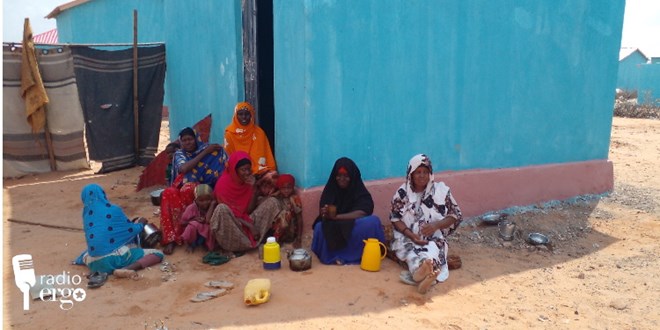
Saturday December 3, 2022

Poor Galkayo IDP families receive land and houses
(ERGO) – Isnino Saleman Dagale, a mother of eight, is happy to have moved in to her own one-room house with a toilet in the Somali city of Galkayo, sharing a solar panel with her two neighbours.
She was paying $10 to live in a small shack in an IDP camp in Buulo-Jawan and often fell behind on rent. She was also evicted from several camps when the land was sold for development, the last time being six months ago.
“Thank God, we have shelter to protect us from the rain. We are now living here permanently; it’s God who provides but we are not worried about house rent now. We used to spend the night clearing the rainwater from the shack!” she said.
They are among 100 families from six camps in Galkayo to receive a 15-metre square plot and a house. The programme led by the Galmudug administration and the UN refugee agency UNHCR aimed to help families break out of the squalid camps. They were also given some water, three blankets, mosquito nets, and utensils.
Isnino was displaced from Qallafe in southern Ethiopia eight years ago, after losing all her 180 goats and 20 cows to the severe drought. Although the house is a great boost, life is still tough for her as she does odd laundry jobs while her two sons work on construction sites.
“There is a lot of unemployment in the city, and it’s to find construction work. If I get $2 a day, we get to enjoy a meal, and if we don’t get anything we sleep hungry,” she said.
Habibo Jeylani Mohamed, a mother of 10, was living in Hiran camp in Galkayo. Six months ago, she was informed that she had been selected to get a house and her life has been different ever since.
She was displaced by drought in 2015 from Buulo Marer, Lower Shabelle. She said she is relieved not to have to struggle to find $10 rent for the poor shelter she had in the camp.
“They used to threaten that they would throw us out if we didn’t pay up. Sometimes we would fail to pay for two months and they would shut us out of our house,” she said.
Habibo’s earns $2 a day cleaning slaughterhouses and removing the waste. Her husband has a kidney problem and she has not been able to pay for his medical care. She still has outstanding loans to pay off from the camp.
The head of social affairs in Galkayo city, Dahir Mohamed Elmi, told Radio Ergo that they had conducted surveys in the camps to identify the families most in need of housing. The city council provided the land and the UN refugee agency UNHCR constructed the houses.
“The people were selected based on their situation; the most deserving people were given the houses. We had many meetings to discuss how the beneficiaries would be selected,” he said.
They are now working on installing a water well for the families, whilst the ministries of health and education have pledged to put up a school and health centre.